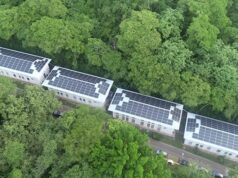 ASBURY PARK, N.J.—The U.S. Department of Energy (DOE) awarded Philips Electronics the Bright Tomorrow Lighting Prize (L Prize) in recognition of being the first company to successfully develop an LED replacement for the common 60-watt incandescent light bulb. Submitted in 2009, the Philips LED bulb was the first and only product to successfully complete 18 months of rigorous field, lab and product testing, meeting or exceeding the high standards established by DOE for quality.
ASBURY PARK, N.J.—The U.S. Department of Energy (DOE) awarded Philips Electronics the Bright Tomorrow Lighting Prize (L Prize) in recognition of being the first company to successfully develop an LED replacement for the common 60-watt incandescent light bulb. Submitted in 2009, the Philips LED bulb was the first and only product to successfully complete 18 months of rigorous field, lab and product testing, meeting or exceeding the high standards established by DOE for quality.
In 2007 the U.S. DOE established a competition, the L Prize, challenging the lighting industry to develop replacement technologies for two of the most widely used and inefficient products: 60 watt incandescent light bulb and PAR 38 halogen light bulb. The DOE recognized that energy efficient alternatives needed to be made readily available and become the new standard for Americans.
The L Prize will enable Philips to invest in the manufacturing and marketing of the lamp in the United States, creating clean energy jobs. In addition, the company will invest in research and development of LED lamps, looking for ways to optimize production and reduce costs. This will help increase adoption of energy-saving LED lighting by overcoming one of the major barriers to LED adoption—price.
Every year it is estimated that more than 425 million 60 watt incandescent light bulbs are sold in the United States alone, representing approximately 50 percent of the domestic incandescent light bulb market. The traditional incandescent that has been the market staple for more than a century uses 10 percent of its energy output for light and wastes the other 90 percent as heat. According to the DOE, an LED replacement for the Edison bulb could save 34 terawatt-hours of electricity in one year, enough to power the lights of nearly 18 million U.S. households. It would also avoid 5.6 million metric tons of carbon emissions annually.
The 60 watt LED equivalent light bulb has a lifetime of more than 25,000 hours, which is 25 times greater than a typical incandescent bulb.
Click here for more information.






